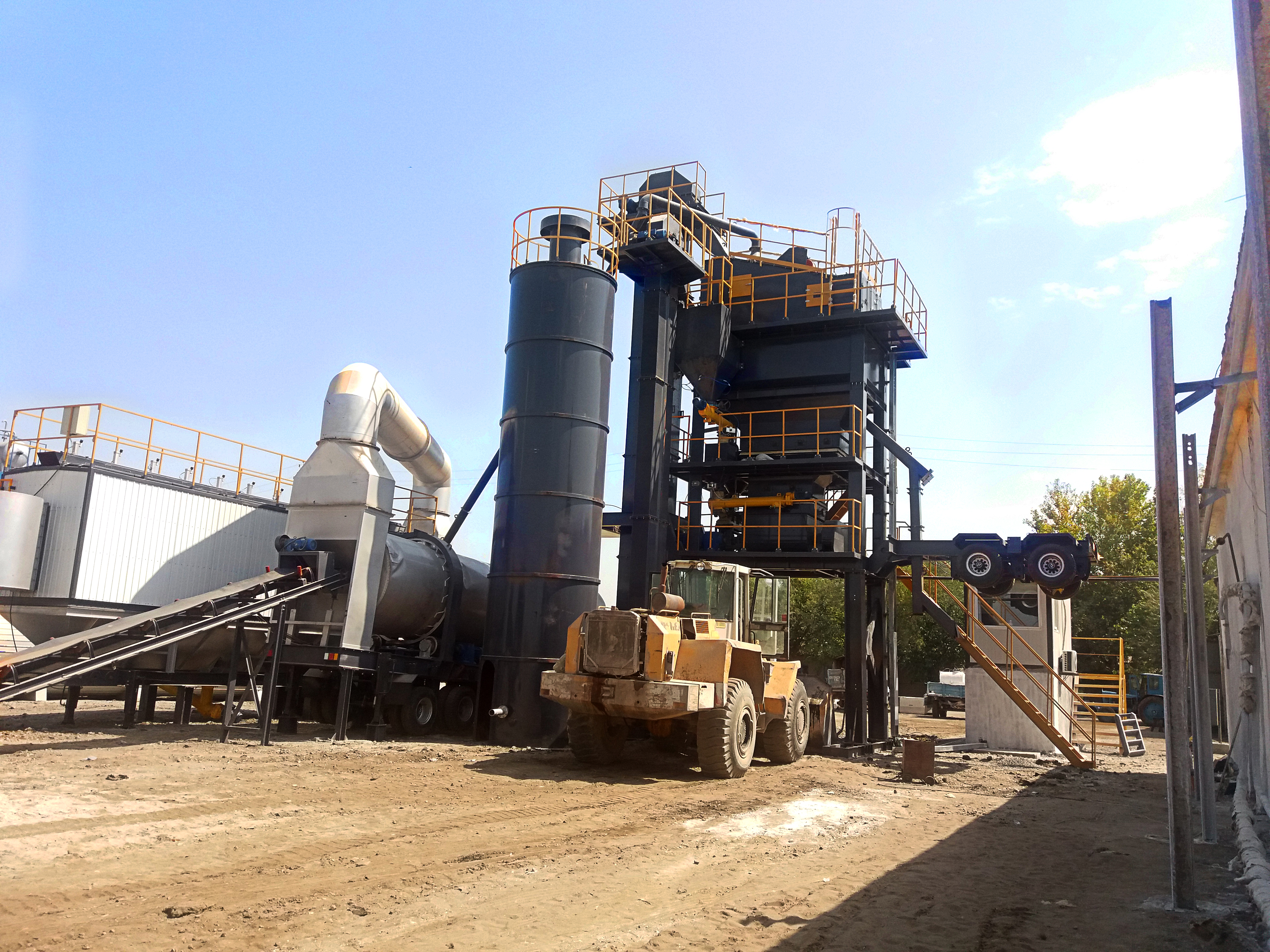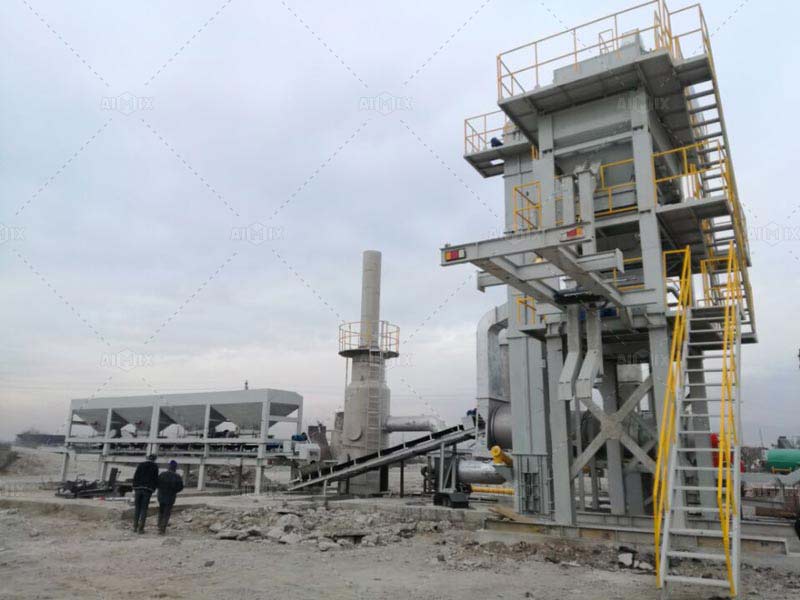Asphalt mixing plant types and considerations
Are you considering investing in an asphalt mixing plant? Making the right choice is crucial, as these plants are significant investments that can greatly impact your road and bridge construction projects. Selecting the wrong plant can lead to costly mistakes, so thorough research is essential. In this article, we'll explore the key factors to consider when choosing an asphalt mixing plant to ensure you get the best value for your investment.
Contents |
[edit] Understanding Asphalt Mixing Plant Types
[edit] 1. Continuous vs. Batch Mixing Plants
Asphalt mixing plants can be broadly classified into two categories: continuous mixing plants and batch mixing plants. Each type has its unique advantages and is suited for different operational needs.
- Continuous Mixing Plants: These plants are ideal for producing large quantities of hot mix asphalt with minimal interruptions. If your projects require consistent specifications and high production rates, a continuous drum mix plant makes financial sense. This type of plant operates continuously, providing a steady flow of asphalt without frequent adjustments.
- Batch Mixing Plants: In contrast, batch plants are perfect for situations where specifications need to change frequently. These plants produce asphalt in discrete batches, allowing for flexibility in mix designs. If your projects involve diverse asphalt mixes or require quick changes between batches, a batch mixing plant will serve you better.
[edit] 2. Assessing Production Needs
When deciding on the type of plant, evaluate your production needs based on the scale of your projects. Consider factors such as the volume of asphalt required, the types of mixes you'll be producing, and how often you'll need to switch between different specifications.
[edit] Researching Manufacturers
[edit] 1. Evaluating Manufacturer Reputation
Once you've determined the type of asphalt mixing plant you need, the next step is to research potential manufacturers. The market is filled with various brands, each offering different models and features. To ensure you make a wise investment, consider the following:
- Local vs. Foreign Brands: Investigate both local reputable brands and established foreign suppliers. Local manufacturers may provide quicker service and parts availability, while foreign brands may offer advanced technology and features.
- Customer Reviews and Testimonials: Look for reviews from other customers who have experience with the manufacturers you're considering. Online searches, industry forums, and social media groups can provide valuable insights into the performance and reliability of different brands.
[edit] 2. Seeking Community Insights
Engage with communities related to asphalt mixing plants and road construction. Experienced users in these groups can offer first hand knowledge about various brands, their performance, and the quality of customer support they received. This peer feedback can help guide your decision-making process.
[edit] Pricing Considerations
[edit] 1. Total Cost of Ownership
While it’s tempting to select an asphalt mixing plant based solely on its initial price, doing so can be a costly mistake. Many first-time buyers focus on acquiring the lowest-priced model without considering the total cost of ownership over the plant's lifespan. Factors to consider include:
- Quality of Materials: Lower-priced plants may use subpar materials, leading to frequent breakdowns and increased maintenance costs. Always assess the quality of the components used in the plant's construction.
- Operational Efficiency: Invest in a continuous plant that offers operational efficiency and long-term reliability. A slightly higher initial investment can save you money in repairs and downtime in the long run.
[edit] 2. Long-Term Value
Before making a final decision, analyze the long-term value of the plant. Consider how well it meets your production needs, the durability of its components, and its adaptability to future projects. A higher-quality plant may provide better performance and a longer lifespan, ultimately proving to be a more economical choice.
[edit] Conclusion
Choosing the right asphalt mixing plant is a critical decision for businesses involved in road and bridge construction. By understanding the types of plants available, researching manufacturers, and evaluating pricing based on total cost of ownership, you can make a well-informed choice that aligns with your operational needs. Remember, investing time in thorough research will ensure you select a plant that offers both value and reliability, setting your business up for success in future projects.
[edit] Related articles on Designing Buildings
- A Short Overview Of An Asphalt Batching Plant Workflow
- A Summary of Concrete Plants: Advantages, Applications, and Types
- Adapting To Site Conditions And Improving Efficiency In Complex Latin American Terrain
- Asphalt.
- Asphalt mixing plant types and considerations
- Binder course.
- Bituminous mixing and laying plant.
- Can a Mobile Asphalt Plant Mix While Moving?
- Carbon Neutrality and Circular Economy Drive Transformation of Mining Equipment in Latin America.
- Case Studies of Peru and Colombia: The Impact of Policies on Crushing Station Procurement
- Component parts of a mobile concrete plant
- Concrete batching plants
- Concrete batching plants; technical requirements for large-scale infrastructure projects
- Concrete boom pumps
- Concrete Pump Selection and Efficiency Improvement Strategies in Latin American High-Rise Building Construction
- Construction plant.
- Detailed Explanation of Pre-Installation Preparations for Aggregate Crushing Plants
- Does a Ready-Mix Concrete Plant Need to Use a Water Heater?
- Does the Installation of a Mobile Concrete Plant Require a Foundation?
- Fixed VS Mobile Asphalt Plants: Which is More Suitable for Project Contractors?
- Global Brands in Latin America and the Market Share of Asphalt Plant Manufacturers
- Groundwater control in urban areas.
- Highway drainage.
- How Chilean Projects Achieve Green And Intelligent Production With Concrete Batching Plants
- How Peruvian Crushing Plants Can Achieve High Capacity And Low Energy Use
- How to Configure Aggregate Production Lines to Achieve Maximum Benefits
- How to Reduce the Energy Consumption of Drum Asphalt Plants?
- Infrastructure.
- Investing in a Portable Concrete Plant
- Is a Self-Loading Concrete Mixer Suitable for Rugged Environments?
- Mastic Asphalt Council.
- Mastic asphalt flooring.
- Mobile asphalt stations.
- Multi-Point Mobile Stone Crushers Under Dispersed Raw Material Distribution
- Overview of the road development process.
- Potential environmental and circular economic value of concrete pumps
- Ready-Mix Vs Conventional Batching Plants: Intelligent Control Differences
- Road construction.
- Road joints.
- Runway construction.
- Self-loading concrete mixers
- Self-loading concrete mixer training and team management
- Small Concrete Plants vs Large Plants: Which One is More Suitable for Your Project Needs?
- Social Responsibility and Sustainability in Stone Crushing Plants in Latin America
- Technical Engineer's Perspective: Performance of Concrete Trailer Pumps in High-Rise Buildings
- The Impact of the Accuracy of the Weighing System on Asphalt Plants
- Top Rated Concrete Mixer Truck Parts In Your Town
- Tracked Mobile Aggregate Crusher Plant with Oil Electric Dual-use
- Types of road and street
- What Are the Basic Parameters of a Mobile Asphalt Plant?
- What Are The Hidden Advantages Of A Mobile Asphalt Plant That Can Be Remotely Monitored?
- Why Is the Concrete Trailer Pump Powerful?
- What to Look for in a Concrete Batching Plant
Featured articles and news
Creativity, conservation and craft at Barley Studio. Book review.
The challenge as PFI agreements come to an end
How construction deals with inherit assets built under long-term contracts.
Skills plan for engineering and building services
Comprehensive industry report highlights persistent skills challenges across the sector.
Choosing the right design team for a D&B Contract
An architect explains the nature and needs of working within this common procurement route.
Statement from the Interim Chief Construction Advisor
Thouria Istephan; Architect and inquiry panel member outlines ongoing work, priorities and next steps.
The 2025 draft NPPF in brief with indicative responses
Local verses National and suitable verses sustainable: Consultation open for just over one week.
Increased vigilance on VAT Domestic Reverse Charge
HMRC bearing down with increasing force on construction consultant says.
Call for greater recognition of professional standards
Chartered bodies representing more than 1.5 million individuals have written to the UK Government.
Cutting carbon, cost and risk in estate management
Lessons from Cardiff Met’s “Halve the Half” initiative.
Inspiring the next generation to fulfil an electrified future
Technical Manager at ECA on the importance of engagement between industry and education.
Repairing historic stone and slate roofs
The need for a code of practice and technical advice note.
Environmental compliance; a checklist for 2026
Legislative changes, policy shifts, phased rollouts, and compliance updates to be aware of.




















